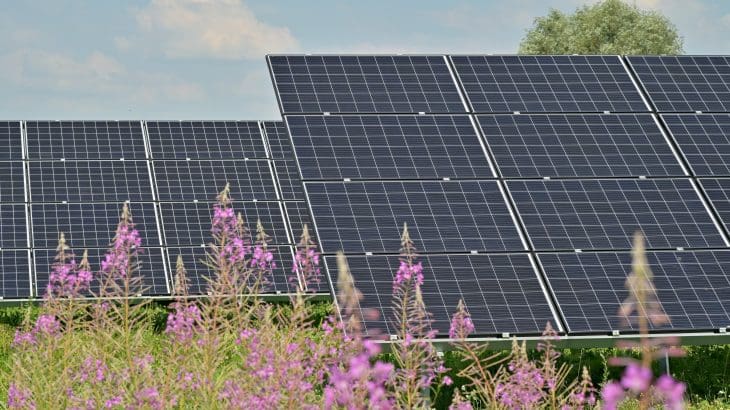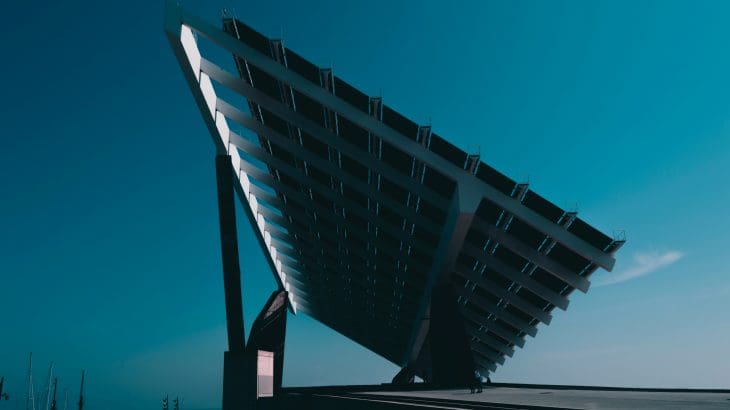A previously delayed 5 MW solar project in Cayman has resumed progress and construction will begin next week. The array, abutting Pease Bay Pond on a former vegetable farm, will begin producing 5 megawatts of electricity for the Caribbean Utilities Company by late April, completing a project delayed since October, and launching Cayman’s first industrial experiment with renewable energy.
Thompson Development Group Director Gene Thompson and Project Manager Ryan Smith said they assumed control of the scheme about three or four months ago and had started construction at the end of February.
Mr. Smith said the racking and underground electrical systems would be completed by mid-March as teams from Clan Construction and solar installer Mega Systems poured 4,000 yards of concrete.
“About the last week of March the panels would go in, and commissioning would start April 10,” extending “about three weeks and finishing at the end of the month,” Mr. Ryan said.
Mr. Thompson and Mr. Smith are building the $18 million project for North Carolina’s Entropy Investment Management, LLC, which bought it from Pittsburgh-based International Electric Power LLC soon after the company was selected on Oct. 30, 2013 by the Electricity Regulatory Authority after a prolonged bidding process.
Subsequent delays were caused by the move from IEP to Entropy, an affiliate of Entropy Cayman Solar Ltd. Extended pricing negotiations among the Charlotte firm, the ERA and CUC concluded on Oct. 30, 2015. The array was originally scheduled for completion in October 2016, but Entropy Managing Partner David March said at the time that financing delays had further intruded.
Development costs, he said, were “considerably higher,” naming prices for training and labor. “Time lines [were] extended, as well as … regulatory evolution.”
“The same was true in the United States,” Mr. March told the Cayman Compass. “Early projects took considerably longer than what is experienced today. We expect the Caribbean will become easier and less expensive to do renewable energy projects as the market matures.”
Builders will create the Bodden Town array in five sections, meaning commissioning will proceed in stages, incrementally achieving full power in late April.
The 5 MW supply is only a fraction of Cayman’s approximately 100 MW demand. While CUC said in October it had “substantially completed” the interconnection mechanism, “including a new 13 kilovolt line,” which will move power from the array into Cayman’s transmission and distribution grid, consumers are unlikely to see much difference in their bills.
Entropy will charge CUC 17 cents for each kilowatt hour it produces during its initial year of operation. CUC, however, will add its own base rate – approximately 10 cents per kWh – to that sum. Because global oil prices are at a historic low, however, the price for a diesel-generated kWh is only 13 cents, contrasted to 2015’s 19 cents. Base rates remain a constant 10 cents.
CUC’s 2106 annual report, issued Feb. 17, said “electricity consumers continued to enjoy the benefit of lower fuel costs in 2016 driven by a reduction in world market fuel prices as well as the Cayman Islands government’s 30 cent per Imperial Gallon reduction in fuel duty ….
“The average Fuel Cost Charge rate per kWh for the 12 months ended Dec. 31, 2016, was $0.13 per kWh compared to the Fuel Cost Charge rate of $0.19 per kWh for the 12 months ended Dec. 31, 2015.”
Former managing director of the ERA Charles Farrington – now executive director for Energy and Utilities at the new Utility Regulation and Competition Office – explained: “CUC will buy the energy from the solar farm in the same manner as it buys solar from the CORE producers.”
CUC’s Consumer Owned Renewable Energy program buys electricity from individuals and companies generating their own power from self-owned solar and wind systems. Consumers buy power back at discounted rates.
“Consumers will see no difference in their bills as the cost of the solar-farm energy is somewhat minuscule compared to the cost of diesel burned, and the costs are not that dissimilar on a kWh basis,” Mr. Farrington said.
A CUC spokeswoman said, “As far as we are aware, the project is scheduled for completion by the second quarter of this year.”


